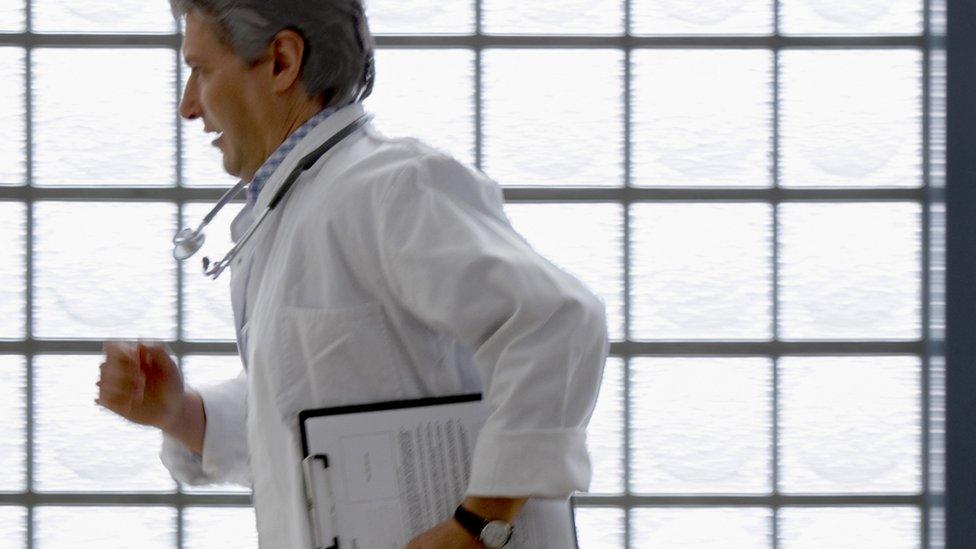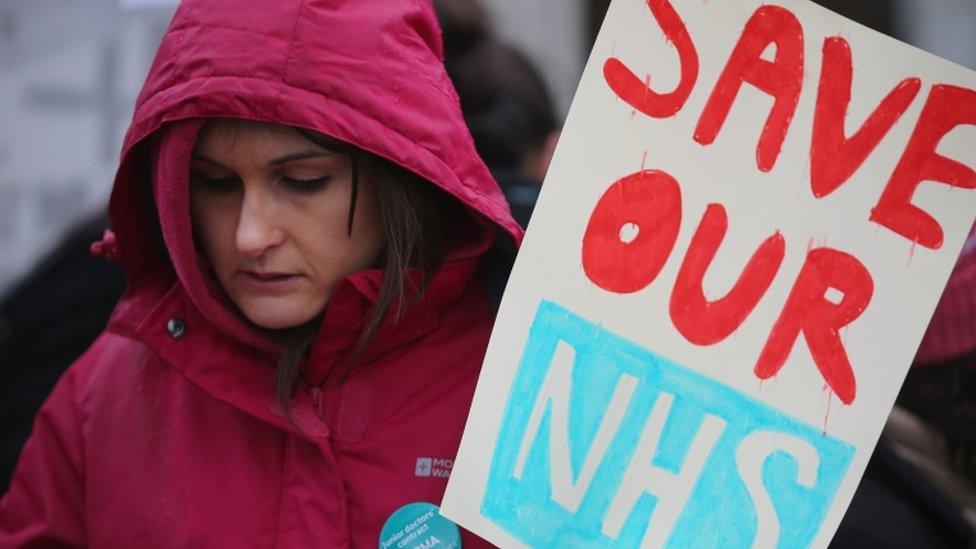Are all-out strike days actually going to be safer?
- Published

The warnings about the forthcoming all-out junior doctor strikes have been coming in so thick and fast that you could be forgiven for thinking it will be Armageddon.
NHS England medical director Sir Bruce Keogh says he worries they will put vulnerable people "at risk", while chief medical officer Dame Sally Davies says they will "inevitably lead to patients suffering" and Health Minister Ben Gummer claims they will be put in "harm's way".
It's easy to understand why. On 26 and 27 April junior doctors will stop providing emergency cover - unlike in the previous strikes in the contract dispute.
It means as well as downing tools for their routine duties, medics will walk out of A&E units and intensive care departments, leaving some of the sickest and most vulnerable patients in the hands of others.
But will the reality of the all-out strike be really as bad as the rhetoric? After all, the doctors' code of conduct produced by the General Medical Council decrees they must not harm patients or put them at risk.
And the British Medical Association is adamant the stoppages do not breach this code because of the contingency plans being put in place.
The union is legally bound to give the NHS seven days' notice of industrial action. In this case the health service has had five weeks.
The time has allowed hospital bosses to carefully consider what they need and put plans in place. This has been done in partnership with BMA reps, while at a national level Department of Health and NHS England officials have been meeting regularly to ensure the contingency arrangements are satisfactory . And as yet no hospital has yet said it cannot cope.

This is because large chunks of the routine work has been postponed and staff will be redeployed into emergency areas. There will be consultants, staff doctors - those who are not in training but have not yet reached consultant level - nurses, midwives and health care assistants in work.
GPs are also being asked to keep a greater number of appointments free for urgent on-the-day cases than normal, while patients will be warned in the lead-up to the strike to think carefully about how they use the health service during the stoppages.
The result is that there are plenty of people who think the system will run pretty smoothly. The Royal College of Obstetricians and Gynaecologists and Royal College of Emergency Medicine have both released statements saying they are satisfied with the arrangements being put in place.
In fact, you could argue the result in some departments may be that the system may actually work better than on a normal day. Take A&E, for example. Having more consultants on the floor could actually speed up the flow of patients as they will be able to make quick decisions about the care patients need. Although there is an argument the smaller hospitals with fewer consultants may find it more difficult.
Meanwhile, in emergency surgery and intensive care the presence of consultants should, in theory, more than make up for the absence of the juniors.
Also, it should be remembered that the stoppages are from 08:00 to 17:00 BST - not for 24 or 48 hours as the previous strikes have been - so there will be some respite during the two days.
Instead, the problems might be more run of the mill. Junior doctors play a vital role chasing up test results, ordering x-rays, taking bloods, ordering prescriptions and preparing patients for discharge.
Consultants may not have the time to do some of these, their skills may be a little rusty or they may simply not know their way round the system to get on top of the jobs. Senior nurses will be able to take some of the strain, but there is bound to be disruption.
However, that doesn't mean the concerns being voiced are not justified. Talking to those who work in the service, there does seem to be a weak spot.
It concerns what happens if there is an unexpected emergency on a general or surgical ward or perhaps in a psychiatric unit. When a patient collapses, a junior doctor would normally be one of the first on the scene.
If they aren't there and a patient dies, questions will be naturally asked. And this, perhaps, is the crux of the matter.
It was a point made by Prof Lord Darzi of Denham, a surgeon and former health minister, in an article in the Daily Telegraph., external. He wrote that every family afflicted with heartbreak on the strike days "would always wonder" whether loved ones would have lived if junior doctors had been there. Trust between doctors and society might be "irreparably damaged", he warned.
This blog was first published on 15 April, but has since been updated to take into account subsequent developments.